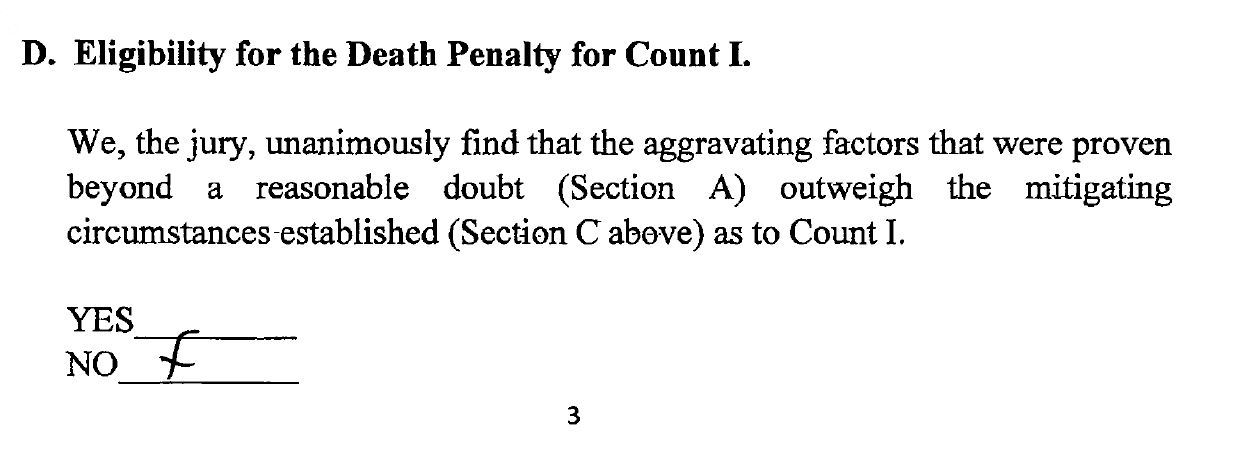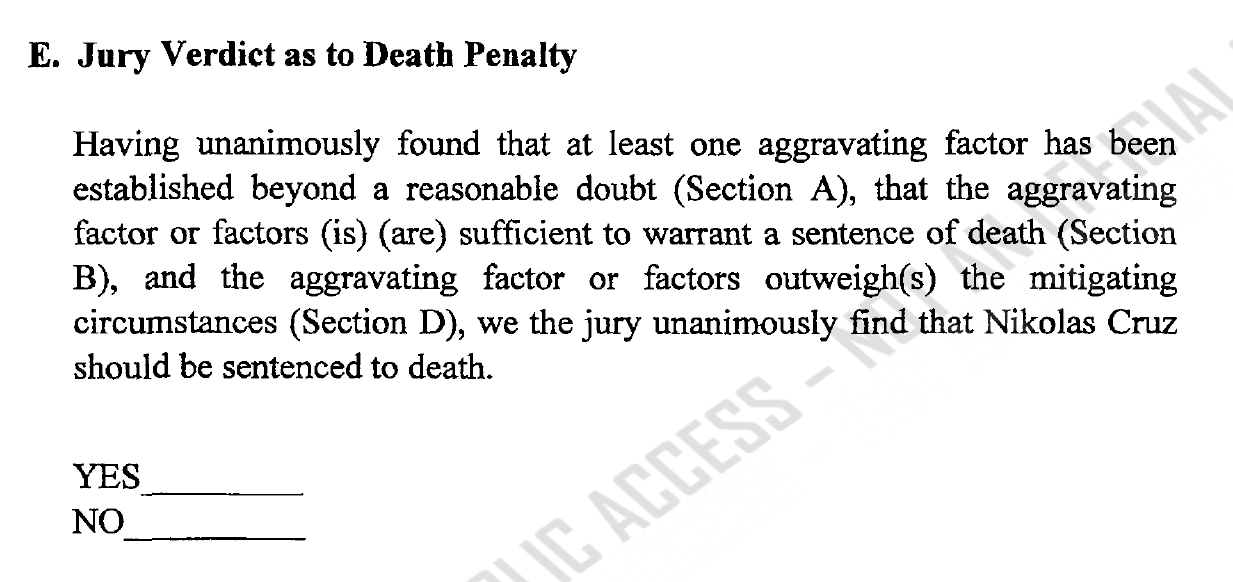Parkland judge reprimanded by Florida Supreme Court
Monday, the Florida Supreme Court publicly reprimanded Judge Scherer, who presided over the Parkland shooter's penalty-phase trial, for her actions that undermined the impartiality of the judiciary.
In February 2018, the shooting at Marjory Stoneman Douglas High School in Parkland, Florida, horrified the nation. Seventeen people, many of whom were children, were killed in the shooting. The shooter, Nikolas Cruz, was charged with 17 counts of premeditated murder. In this post:
How the Parkland case had widespread effects on Florida’s capital sentencing system
The Florida Supreme Court’s public reprimand of Judge Elizabeth A. Scherer, who presided over the trial
Jury’s penalty-phase determination caused systemic change to capital sentencing in Florida
Cruz pleaded guilty to all counts. In late 2022, Cruz was tried in a penalty-phase only trial in which the jury was asked to determine the appropriate sentence for Cruz: either life imprisonment without parole (LWOP), or death. Cruz was tried under Florida’s post-Hurst capital sentencing statute that required unanimity throughout the jury’s determination and in the jury’s final recommendation for death.1
In October 2022, at the close of the trial, the jury determined the appropriate sentence for Cruz was LWOP. The jury did not reach the final recommendation portion of its deliberations but, instead, determined that the aggravation did not outweigh the mitigation. The full jury verdict (71 pages) form can be downloaded here.
Explaining the jury’s determination
The media often says that the jury recommended LWOP rather than death. That is not accurate. Florida’s capital sentencing statute at the time of Cruz’s trial provided:
(b) The jury shall return findings identifying each aggravating factor found to exist. A finding that an aggravating factor exists must be unanimous. If the jury:
1. Does not unanimously find at least one aggravating factor, the defendant is ineligible for a sentence of death.
2. Unanimously finds at least one aggravating factor, the defendant is eligible for a sentence of death and the jury shall make a recommendation to the court as to whether the defendant shall be sentenced to life imprisonment without the possibility of parole or to death. The recommendation shall be based on a weighing of all of the following:
a. Whether sufficient aggravating factors exist.
b. Whether aggravating factors exist which outweigh the mitigating circumstances found to exist.
c. Based on the considerations in sub-subparagraphs a. and b., whether the defendant should be sentenced to life imprisonment without the possibility of parole or to death.
(c) If a unanimous jury determines that the defendant should be sentenced to death, the jury’s recommendation to the court shall be a sentence of death. If a unanimous jury does not determine that the defendant should be sentenced to death, the jury’s recommendation to the court shall be a sentence of life imprisonment without the possibility of parole.
(Emphasis added.)
The jury’s deliberations ended at the emphasized portion above. When the jury did not unanimously determine that the aggravation in Cruz’s case outweighed the mitigation, the jury’s deliberations stopped.
The jury did not proceed to Part E of the verdict form, where the jury would have—if it had answered YES in Part D—voted as to the appropriate sentence:
In other words, the jury did not “recommend” LWOP but, instead, LWOP was the required sentence based on the jury’s determination that the aggravation did not outweigh the mitigation. This was the same for all 17 counts.
News articles about the jury’s determination:
Outcome caused change to Florida’s capital sentencing statute
The outcome of Cruz’s trial caused the change to Florida’s capital sentencing scheme, which went into effect April 20, 2023. In short, the new law lowered the threshold required for the jury to recommend a sentence of death from 12-0 to 8-4. It was made clear throughout the legislative process that the Cruz trial being the impetus for the new legislation.
TFDP covered the entire legislative process that led to this new legislation. It is available in the Archive.
Judge Elizabeth A. Scherer
Judge Elizabeth A. Scherer was appointed to the bench in 2012. When she presided over Cruz’s penalty-phase trial, it was her first death penalty trial. Since the trial, there have been several proceedings related to her apparent bias against the defense.
Disqualified from another capital case
On April 13, 2023, the Florida Supreme Court issued a unanimous decision in Tundidor v. State,2 holding that Judge Scherer should have granted Randy Tundidor’s motion to disqualify her from his case. Tundidor is currently on death row in Florida. In 2019, Tundidor filed an initial postconviction motion. Judge Scherer was assigned to his case.
In November 2022, Tundidor filed a motion to disqualify Judge Scherer based on “the appearance of impropriety and actual bias” related to what happened in the Cruz trial. The motion alleged, in part:
[O]n November 2, 2022, immediately after sentencing Cruz, Judge Scherer left the bench and, while still in her judicial robe, exchanged hugs with the victims’ families and members of the prosecution team, one of whom was Assistant State Attorney Steven Klinger, who is also the prosecutor in Tundidor's case. Tundidor also alleged that while off the record at a status hearing in Tundidor's case on November 4, 2022, Judge Scherer “sympathetically” asked ASA Klinger how he was doing.
Further:
Judge Scherer's conduct, both at the Cruz proceedings and that witnessed at the November 4 hearing in Mr. Tundidor's case, raises the appearance of impropriety and/or actual bias in favor of the State. Judge Scherer's hugging the Assistant State Attorney prosecuting Mr. Tundidor, and then commiserating with that same prosecutor at a hearing in Mr. Tundidor's case, shows that she shares a special relationship with the prosecutor and bias in favor of the State. Under the facts stated in this motion, any capital defendant would have an objectively, well-founded, reasonable fear that he would not receive a fair hearing. Mr. Tundidor reasonably fears that he cannot receive a fair hearing before Judge Scherer.
Judge Scherer denied the Motion, and Tundidor sought the Florida Supreme Court’s review.
The Court concluded that Judge Scherer should have granted the motion, writing:
[T]he combination of certain circumstances contained in the allegations in Tundidor's motion regarding the actions of Judge Scherer in the Cruz case on November 2, 2022, and in Tundidor's case on November 4, 2022, which he alleged showed a sympathy with the State that was linked to the outcome of another capital case, would create in a reasonably prudent person a well-founded fear of not receiving a fair and impartial proceeding. The crucial facts that together were sufficient to create such a well-founded fear are the hugging of ASA Klinger by Judge Scherer—in the court room while still wearing a robe—at the conclusion of the Cruz murder case, and the personal exchange between Judge Scherer and ASA Klinger two days later, during Tundidor's postconviction proceedings, in which the judge commiserated with Klinger.
Because Tundidor's motion provided a legally sufficient basis for disqualification, the trial court erred in denying it.
Resignation
In May 2023, Judge Scherer tendered her resignation to Gov. DeSantis, effective June 30. Her letter to Gov. DeSantis did not explain her reasons for resigning. Her Florida Bar profile still indicates she is a Member of the Judiciary.
News Articles about Resignation:
Reprimanded by Florida Supreme Court
Months after the trial, the Florida Judicial Qualifications Commission (JQC) investigated allegations that Judge Scherer “engaged in inappropriate behavior while presiding over the penalty-phase and sentencing proceedings” in Cruz’s case. On April 7, 2023, an Investigative Panel of the JQC served a Notice of Investigation on Judge Scherer. On April 27, the Panel held a hearing, at which Judge Scherer provided sworn testimony.
On June 5, the JQC issued a Report following the investigation. The Report stated that the JQC “substantiated some allegations, including that Judge Scherer unduly chastised defense counsel, wrongly accused defense counsel of threatening her children . . ., failed to curtail vitriolic statements directed to defense counsel, and embraced members of the prosecution after sentencing.” In addition, “Judge Scherer acknowledged also embracing victims and family members of the victims in the courtroom.”
Acknowledging that the “proceedings were emotional and highly contentious,” the JQC stated that it “expects that a judge will ensure due process, order and decorum, and act always with dignity and respect to promote the integrity and impartiality of the judiciary.” At times, the JQC found, “Judge Scherer allowed her emotions to overcome her judgment.”
The Report states that “Judge Scherer’s recent resignation was not a condition of th[e] agreement.”
The Report explains that the JQC and Judge Scherer entered into a Stipulation, and the JQC recommended “that the interests of justice will be well-served by a public reprimand.” The Report was filed with the Florida Supreme Court.
On Monday, July 24, the Florida Supreme Court publicly reprimanded Judge Scherer in a written Order.
The Order reads in full:
For a full explanation of Hurst and Florida’s post-Hurst statute, see the TFDP five-part series on Hurst, available here.
361 So. 3d 775 (Fla. 2023).








